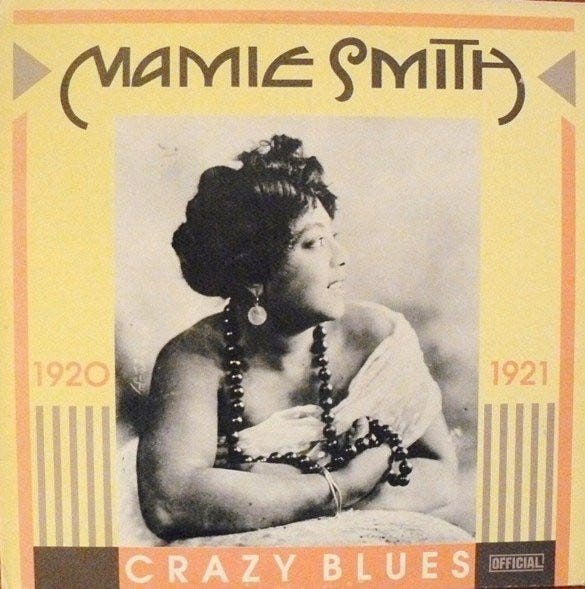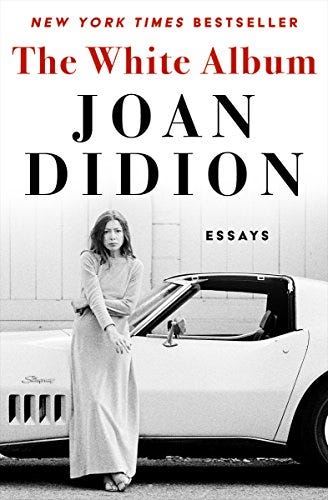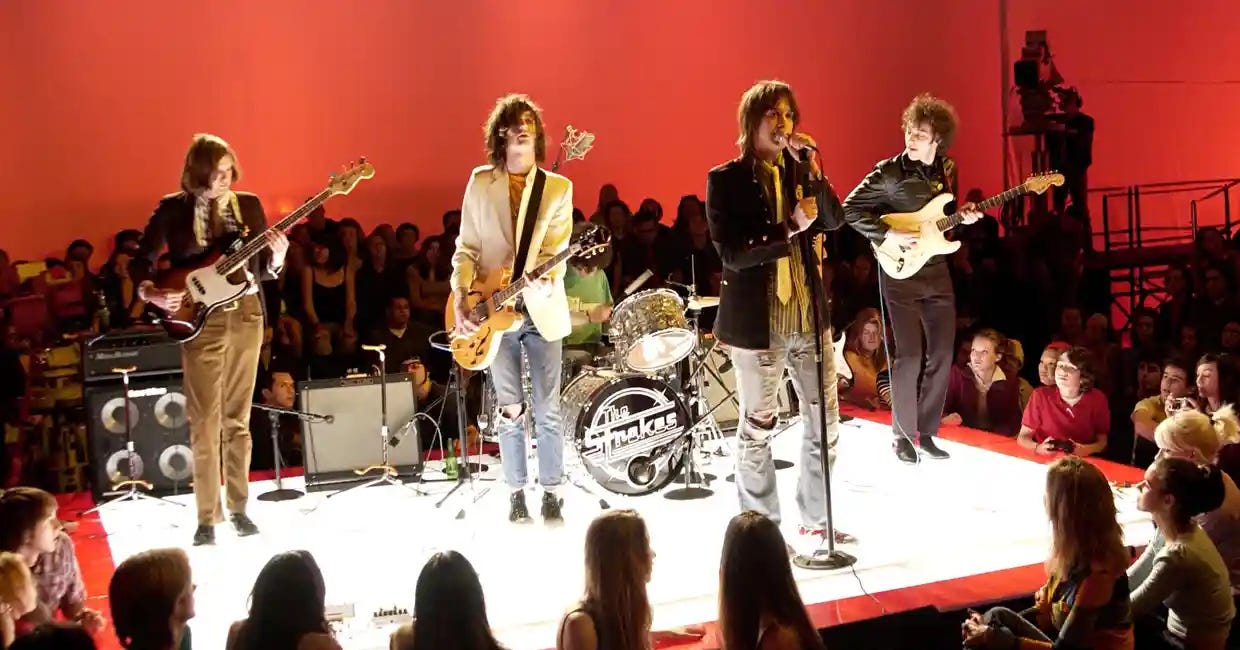Dear readers, The Third Ear turned two yesterday, on the Ides of March.
Thank you for listening.
As a birthday present to my third organ, I’m going to toot my own horn—by presenting The Third Ear’s Greatest Hits, along with some exciting new developments.
The “Taking Notes” feature, launched several weeks ago, was meant to connote the process of capturing bits of culture (note-taking), as well as, sometimes, stealing lyrical inspiration from them (taking music “notes”).
In the last installment, for example, I used my notes on Robert Briffault’s book The Troubadours to produce an English translation of a thousand-year-old love song, which inspired my own flamenco number.
Maybe I’ll share it with you, once it sounds better than Ben Affleck doing Mariachi.
I digress.
Above all, note-taking is an act of memory, and paying attention. “Taking notice” of what’s come across the transom—particularly since I started this newsletter.
In that sense, all of the pieces I’ve written for The Third Ear are a form of note-taking (some of them quite extensive). So it would be foolish not to review them, and remember what I’ve been on about.
I notice myself coming back to the same themes—music, language and history; humor, the carnivalesque and grotesque; mimesis, scapegoating and primitivism; the sacred and profane, free expression and creativity; inquiry and curiosity over ideology—familiar themes, with novel variations, in response to current events and experiences. Whether they transpire in Berkeley or Tulsa, Campagna or Austria, Mexico City or Andalusia. In the state of my birth (Texas), or my adoptive hometown of Portland, Oregon.
My first article series, which I’ll link to shortly, wound up involving the so-called “heir to Hunter S. Thompson,” former Rolling Stone journalist Matt Taibbi, by way of a conversation between his former boss, RS founder Jann Wenner, and cultural historian Greil Marcus. The Rolling Stone series, collectively known as “Gathering Moss,” was born of a trip to Berkeley.
My second travel-based series revolved around the so-called “World of Bob Dylan,” part of the Switchyard “festival of literature, music and ideas” in Tulsa, Oklahoma. A gathering of “Aspergian superfans,” as one commentator describes such people, discoursing on the Bard of the Iron Range. Our Harmonica Shakespeare, Bob Dylan.
Between Berkeley and Tulsa, I plugged Radio Silence, a now-defunct, uniquely-original print publication dedicated to “Literature and Rock & Roll,” whose founding editor, Dan Stone, I’d contacted in the hopes of retrieving several lost articles by Scott Timberg, a former culture writer for the L.A. Times who, sadly, took his own life following the death of his livelihood, print. Dan Stone is now the Head of Culture and Music at Substack.
It was through Timberg’s excellent Radio Silence series, “Origins of the Creative Class,” that I discovered musicologist
—who, if you’ve been reading The Third Ear at all, you’ll recognize as an indispensable culture critic for our times, over at The Honest Broker, on Substack. Many thanks to Dan Stone, who once lived in Portland, for sharing Timberg’s work. And to Scott, whom I never met, but changed the way I think about art and music.Both of the travel series I mentioned, covering Tulsa and Berkeley, the World of Bob Dylan and the world of Rolling Stone, revolved around free expression, dialogue and open inquiry… and the dearth of it in mainstream journalism at the time—one of the reasons I gravitated towards Substack in the spring of 2023.
I was fed-up with trying to get a book published through a local press in Portland, which seemed eager to charge editing fees but reluctant to take on anything remotely controversial or out-of-synch with the times, despite their proclaimed edginess and loud embrace, in their mission statement, of the word “Fuck.”
At the same time, for similar reasons but from a much grander standpoint of professional achievement, well-known writers and journalists, including writers like Matt Taibbi, Sherman Alexie, and Ted Gioia, were leaving traditional publishing for Substack.
Many of the journalists I followed here, some of whom I’ve covered at The Third Ear, were “canceled.” In the case of two Pacific Northwest journalists I’ve written about, who went on to start successful publications and podcasts—Nancy Rommelmann of Portland and Katie Herzog of Seattle—they were exasperated enough to leave their hometown publications, and their homes. “Edgy,” but not exactly openminded, these places at that time.
You can read about Rommelmann, Herzog, and their excellent coverage of #MeToo and other cancelation campaigns, in my own series on cancelation, the first article of which I’ll link to below.
Another journalist at the time, Michael Moynihan, a correspondent and producer for HBO, Vice News, and The Daily Beast, finally quit Vice in 2023, after being shunted into the publication’s proverbial basement—along with covers of the magazine’s past issues. Once edgy (like Rolling Stone), the covers were now deemed politically incorrect for Vice’s new ethos.
Moynihan, whose Free Press review of A Complete Unknown I quoted in a recent essay about the new Bob Dylan biopic, founded a “weekly rhetorical assault on the news cycle, the people who make it, and occasionally ourselves,” known as The Fifth Column podcast. Alongside co-hosts
(L.A. Times, Reason Magazine, a recurring guest on CNN, NBC, Fox and HBO) and Kmele Foster, who produced a probing interview with late-great music producer Steve Albini that I mentioned several months ago, and also sits on the board of the Foundation for Individual Rights and Expression (FIRE)—the new ACLU. Foster is accompanied by the former Executive Director of the ACLU, “Mighty Ira” Glasser, on the board of FIRE.Representatives from FIRE led a panel discussion at the Tulsa Switchyard that I covered in 2023, about book bans—something the ACLU had shamefully endorsed at the time, for political reasons.
I’ve mentioned The Fifth Column more than once, in my recommendations column, “Bits and Pieces”—mostly for the podcast’s erudite (and granular and trivial) knowledge of recent musical history, which has also informed several articles. I covered the cancelation of former Portland journalist Nancy Rommelmann, and the Seattle Stranger’s Katie Herzog, as part of my series on the history of scapegoating and its modern corollary, cancelation. I reference Rommelmann’s writing for her perspectives on Portland in the summer of 2020, as well as her coverage of Tulsa and Native American culture, along with her “Smoke ‘Em If You Got ‘Em” podcast partner Sarah Hepola, of Texas Monthly and The Dallas Morning News (most recently, I mentioned their discussion of A Complete Unknown).
And as I said, The Third Ear began, in part, by covering the founder of Rolling Stone magazine and his erstwhile golden boy, journalist Matt Taibbi.
So imagine my surprise when I happened to read the Fifth Column’s weekly recommendations letter—something, admittedly, I rarely do (my own readers can probably relate)—to see Matt Welch begin by mentioning an upcoming visit to Tulsa. More surprising still, among that week’s recommendations was listed a new feature from Matt Taibbi, whose name caught my eye, and made me stop skimming.
Lucky for me:
As I was poring through my “notes” and compiling the Greatest Hits below, I heard from fellow Fif’ listener Nancy Rommelmann, who had some unbelievably kind words to say about my coverage—really, Katie Herzog’s coverage, pieced together by me—of Portland cancelation campaigns circa 2019. (If you’re on X Twitter, you can view Nancy’s comments here, now that Mr. Musk has ceased trying to throttle Substack out of existence, sort of.)
Thanks to
for the encouragement in year one, and thanks to Matt Welch, Nancy Rommelmann, et al for the boost at the beginning of year three.You never know who reads this stuff.
Greatest Hits
Third in a series about Jann Wenner and Rolling Stone—“Gathering Moss: Eating with Rolling Stone at the Free Speech Cafe.” The crux of the biscuit: Elon Musk’s Twitter takeover, Matt Taibbi’s #TwitterFiles, Free Speech, and “Digital Cognition.”
Have a taste. If you can stomach five courses, sample the rest in the archives.
Origins of the Creative Class
In the 2010’s, after the music industry had been leveled by Napster, when print was going the way of the Dodo and social media still had a shiny halo around its head, a quixotic editor named Dan Stone founded a journal dedicated to the dying business of “Literature and Rock & Roll.” He named it
First in a series about Scott Timberg’s “Origins of the Creative Class,” as featured in Dan Stone’s Radio Silence magazine.
Part one in the history of mimesis in American popular music, beginning with Mamie Smith’s “Crazy Blues.”
Two Masterpieces of 70s Journalism
The 1960s and 70s were characterized by an American literary movement known as New Journalism.
Making sense of the 2020s through Joan Didion’s “The White Album” and Tom Wolfe’s “The ‘Me’ Decade.”
American Humor
On the Lyft ride to the Portland airport, en route to Tulsa Switchyard’s “national festival of art, music and ideas,” I was chatting up the driver—or rather, he was chatting up me, as drivers often do.
Does anybody remember laughter?
History is a Lovesick Boy
I wrote the following in the wake of July 4th, 2020. “Because I don’t know what I think until I read what I say,” in the words of one imperfect woman.
Reflecting on the summer of 2020 in Portland.
"What do you think about Osama bin Laden? What do you think about the Strokes?"
There’s no need to be an asshole, you’re not in Brooklyn anymore.
How 9/11 created the Brooklyn hipster.
"The Endless and Noisy Chorus"
Meet Me in the Bathroom - the documentary film adapted from Lizzy Goodman’s superior oral-history, Rebirth and Rock and Roll in New York City 2001-2011 (which I wrote about last week in the context of 9/11) - is bookended by voiceover incantations from Walt Whitman’s
“The Making of Nikole Hannah-Jones” by Marc Weitzmann, our millennial Tocqueville.
Laughter is medicine. Film review.
Forget the Alamo
I’ve covered some outré stories at The Third Ear—about human sacrifice. Pagan orgies. Emperor Nero. Jann Wenner of Rolling Stone. And Congress.
“Do you remember”… Phil Collins?
Electric Medicine
If pop culture, as Greil Marcus defined it, is “stories the market tells about itself,” this one is a doozy.
Love songs, Border-Blasters and goat testicles. The quack who took country music national.
Pandora's Box: a brief history of the "magic mushroom" in American pop culture
A few months ago, I spotted a peddler most strange. Like Jack going to market for to sell the family cow, I encountered a crier selling what might as well have been magic beans.
Psilocybin meets decolonization, Big Pharma, and Portland.
Loving the Dead
It’s funny the way most people love the dead. Once you are dead, you are made for life.
Why Jimi Hendrix bios disappoint (it’s the music).
Deceitful Above All Things
If you haven’t noticed, The Third Ear occasionally covers imitation and scapegoating, related phenomena.
Cancelation, à la Portland.
New Bob Dylan bio meets Ralph Ellison’s Invisible Man.
Thanks to everyone for reading. See you in year 3.
























Second anniversary? Wow. Time flies. Good for you, Trey!